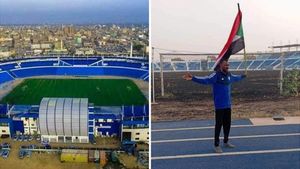ROME — A significant ruling by the Italian appeals court on February 1, 2025, has once again stymied the government's efforts to expedite the expulsion of asylum seekers to Albania, resulting in the return of 43 migrants back to Italy. The appeals court's decision reflects growing tensions between Prime Minister Giorgia Meloni's far-right administration and the Italian judiciary, as it marked the third failed attempt to transfer migrants under her controversial migration policy.
The legal battle ensued after 49 individuals were transferred to asylum processing centers in Albania by the Italian navy ship on January 30. Of those, six were returned on the same day — four minors and one deemed vulnerable — raising immediate questions about the treatment and rights of migrants under Italy's new policy, which aims to process asylum applications outside the European Union.
According to reports from the Italian media and legal experts, the migrants included individuals from Bangladesh, Egypt, Ivory Coast, and Gambia. Their asylum requests had already been rejected, yet the court's decision indicates there are serious concerns about legality and human rights associated with their potential expulsion.
President of Italy’s Association of Juridical Studies on Immigration, Lorenzo Trucco, praised the court's refusal to approve the expulsion but expressed deep concern over the broader implications of growing authoritarianism against migrant rights. "There is this wind of authoritarianism of compression of rights,” Trucco stated. "Migrant asylum seekers are not considered as real subjects of law, but people who have very limited access to rights," he added, highlighting the precarious status of migrants within the current legislative framework.
This recent judicial ruling has upended Prime Minister Meloni's plans, which previously included signing a controversial five-year agreement aimed at relocating up to 3,000 migrants per month beyond EU borders as part of her program to combat illegal migration. This agreement was intended to shift asylum processes to the non-EU nation of Albania, presenting significant challenges to both the Italian government and aspiring migrants, as well as raising substantial concerns among human rights advocates.
The court has referred the case to the European Court of Justice, which is expected to issue its ruling on February 25. This forthcoming decision will likely address legal uncertainties pertaining to which European nations are classified as safe for repatriation of migrants whose asylum claims have been denied.
The strained relationship between the Meloni government and the Italian judiciary is not new. Previous attempts to expedite the expulsion of smaller groups of migrants were similarly halted by legal challenges, each time prompting the courts to seek guidance from the European court concerning the safety and legality of repatriation practices. The increasing number of migrants arriving daily on Italian shores, with 3,704 arrivals already logged for January 2025 — up significantly from the same period last year — only adds fuel to the fire surrounding Italy’s migration policy.
While Meloni has expressed frustration over these legal hurdles, recently likening her struggles to Penelope, the mythical wife of Ulysses who endlessly weaved and unraveled her work, her administration has faced consistent pushback on its policies. Many view the current situation as emblematic of broader societal debates over immigration rights and governmental authority.
On the ground, the realities for migrants grow more complicated. Reports indicate the Italian navy will bring back the remaining 43 asylum seekers from Albania, marking another chapter in the contentious saga of Italy's efforts to handle its immigration crisis. The developments have sparked significant interest, not only within Italy but across Europe, raising questions about the future of migrant rights and Italy's legal obligations under EU law.
With the European Court of Justice poised to rule on outstanding cases involving migrants and safety concerns, Italy's battle to redefine its migration policies continues. Amidst these proceedings, which are emblematic of the political and legal divergency, the fundamental rights of thousands hang critically in the balance.



